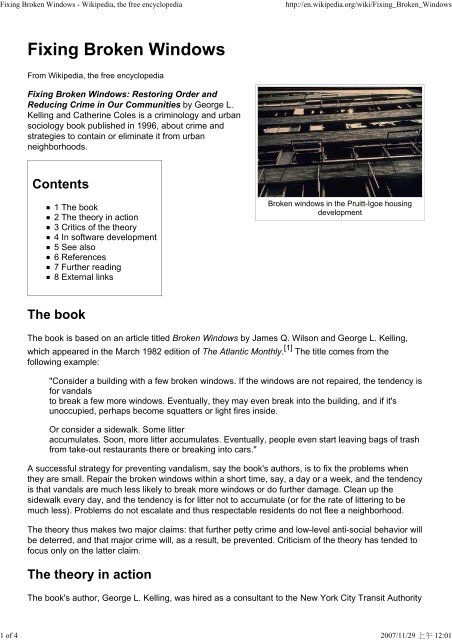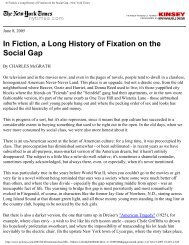Fixing Broken Windows - Wikipedia, the free encyclopedia
Fixing Broken Windows - Wikipedia, the free encyclopedia
Fixing Broken Windows - Wikipedia, the free encyclopedia
- No tags were found...
Create successful ePaper yourself
Turn your PDF publications into a flip-book with our unique Google optimized e-Paper software.
<strong>Fixing</strong> <strong>Broken</strong> <strong>Windows</strong> - <strong>Wikipedia</strong>, <strong>the</strong> <strong>free</strong> <strong>encyclopedia</strong>http://en.wikipedia.org/wiki/<strong>Fixing</strong>_<strong>Broken</strong>_<strong>Windows</strong>1 of 4 2007/11/29 上 午 12:01<strong>Fixing</strong> <strong>Broken</strong> <strong>Windows</strong>From <strong>Wikipedia</strong>, <strong>the</strong> <strong>free</strong> <strong>encyclopedia</strong><strong>Fixing</strong> <strong>Broken</strong> <strong>Windows</strong>: Restoring Order andReducing Crime in Our Communities by George L.Kelling and Ca<strong>the</strong>rine Coles is a criminology and urbansociology book published in 1996, about crime andstrategies to contain or eliminate it from urbanneighborhoods.Contents1 The book2 The <strong>the</strong>ory in action3 Critics of <strong>the</strong> <strong>the</strong>ory4 In software development5 See also6 References7 Fur<strong>the</strong>r reading8 External links<strong>Broken</strong> windows in <strong>the</strong> Pruitt-Igoe housingdevelopmentThe bookThe book is based on an article titled <strong>Broken</strong> <strong>Windows</strong> by James Q. Wilson and George L. Kelling,which appeared in <strong>the</strong> March 1982 edition of The Atlantic Monthly. [1] The title comes from <strong>the</strong>following example:"Consider a building with a few broken windows. If <strong>the</strong> windows are not repaired, <strong>the</strong> tendency isfor vandalsto break a few more windows. Eventually, <strong>the</strong>y may even break into <strong>the</strong> building, and if it'sunoccupied, perhaps become squatters or light fires inside.Or consider a sidewalk. Some litteraccumulates. Soon, more litter accumulates. Eventually, people even start leaving bags of trashfrom take-out restaurants <strong>the</strong>re or breaking into cars."A successful strategy for preventing vandalism, say <strong>the</strong> book's authors, is to fix <strong>the</strong> problems when<strong>the</strong>y are small. Repair <strong>the</strong> broken windows within a short time, say, a day or a week, and <strong>the</strong> tendencyis that vandals are much less likely to break more windows or do fur<strong>the</strong>r damage. Clean up <strong>the</strong>sidewalk every day, and <strong>the</strong> tendency is for litter not to accumulate (or for <strong>the</strong> rate of littering to bemuch less). Problems do not escalate and thus respectable residents do not flee a neighborhood.The <strong>the</strong>ory thus makes two major claims: that fur<strong>the</strong>r petty crime and low-level anti-social behavior willbe deterred, and that major crime will, as a result, be prevented. Criticism of <strong>the</strong> <strong>the</strong>ory has tended tofocus only on <strong>the</strong> latter claim.The <strong>the</strong>ory in actionThe book's author, George L. Kelling, was hired as a consultant to <strong>the</strong> New York City Transit Authority
<strong>Fixing</strong> <strong>Broken</strong> <strong>Windows</strong> - <strong>Wikipedia</strong>, <strong>the</strong> <strong>free</strong> <strong>encyclopedia</strong>http://en.wikipedia.org/wiki/<strong>Fixing</strong>_<strong>Broken</strong>_<strong>Windows</strong>4 of 4 2007/11/29 上 午 12:01William J. Bratton. Turnaround: How America's Top Cop Reversed <strong>the</strong> Crime Epidemic. RandomHouse, 1998.Wesley G. Skogan. Disorder and Decline: Crime and <strong>the</strong> Spiral of Decay in AmericanNeighborhoods. University of California Press, 1990.John E. Eck & Edward R. Maguire, "Have Changes in Policing Reduced Violent Crime?" inAlfred Blumstein and Joel Wallman, eds. The Crime Drop in America, rev. ed. CambridgeUniversity Press, 2006.Thacher, David. (2004) "Order Maintenance Reconsidered"(http://sitemaker.umich.edu/dthacher/files/OrderMaintenance.pdf) (PDF link, full-text, 2MB).Steven Levitt, Stephen J. Dubner. "Freakonomics : A Rogue Economist Explores <strong>the</strong> HiddenSide of Everything". William Morrow, 2005. ISBN 0-06-073132-XBernard E. Harcourt, "Illusion of Order: The False Promise of <strong>Broken</strong> <strong>Windows</strong> Policing"(Harvard 2001) ISBN 0-674-01590-8Harcourt, Bernard E. and Ludwig, Jens, "<strong>Broken</strong> <strong>Windows</strong>: New Evidence from New York Cityand a Five-City Social Experiment" . University of Chicago Law Review, Vol. 73, 2006.Malcolm Gladwell. The Tipping Point: How Little Things Can Make a Big Difference. Back BayBooks, 2002. ISBN 0-316-34662-4External linksOriginal March 1982 article (http://<strong>the</strong>atlantic.com/politics/crime/windows.htm) — Fee-based siteregistration requiredCorman, Hope. Carrots, Sticks and <strong>Broken</strong> <strong>Windows</strong>(http://courses.washington.edu/pbaf512a/Carrotspaper.June13.pdf) (2002) (PDF link) [Requireswashington.edu account]Legal Affairs magazine(http://legalaffairs.org/webexclusive/debateclub_brokenwindows1005.msp) - a review of <strong>the</strong>criticisms of <strong>the</strong> broken windows <strong>the</strong>ory.Shattering "<strong>Broken</strong> <strong>Windows</strong>": An Analysis of San Francisco's Alternative Crime Policies.(http://www.cjcj.org/pubs/windows/windows.html) - An Article by Center on Juvenile and CriminalJustice detailing crime reduction in San Francisco achieved via alternative crime policies.Abstract of <strong>the</strong> Harcourt and Ludwig paper (http://ssrn.com/abstract=743284) .A critique of <strong>the</strong> role of <strong>the</strong> police in reducing crime rates(http://blogcritics.org/archives/2006/09/26/221035.php)Retrieved from "http://en.wikipedia.org/wiki/<strong>Fixing</strong>_<strong>Broken</strong>_<strong>Windows</strong>"Categories: All pages needing cleanup | <strong>Wikipedia</strong> articles needing factual verification since July 2007| Sociology books | Criminology | Urban decay | Law enforcement <strong>the</strong>ory | Sociology | EnvironmentalpsychologyThis page was last modified 18:27, 20 October 2007.All text is available under <strong>the</strong> terms of <strong>the</strong> GNU Free Documentation License. (See Copyrightsfor details.)<strong>Wikipedia</strong>® is a registered trademark of <strong>the</strong> Wikimedia Foundation, Inc., a U.S. registered501(c)(3) tax-deductible nonprofit charity.















